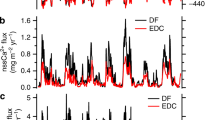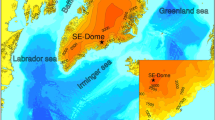Abstract
THE possible existence of an oceanic source of atmospheric SO2 has recently been suggested for the following reasons. First, to account for the observed1 SO2 background concentration of 0.1 × 10−6g m−3 of air, even very far from any continental source and in areas as remote as the Antarctic ocean—despite a residence time for SO2 in the marine atmosphere of ∼0.7 d (refs 2, 3). Second, because another major source such as the ocean is necessary to complete the global atmospheric sulphur budget4–7. Because of the basic pH of seawater, SO2 cannot be emanated directly from the oceans. According to Lovelock et al.8, the dimethyl sulphide (DMS) produced in the sea by many living systems, could be evolved in a first step into the atmosphere and subsequently oxidised to SO2. These authors observed a mean DMS concentration of the order of 12 × 10−9 gl−1 in Atlantic ocean water. We have developed an improved method for the measurement of DMS in seawater and have used this technique on several recent oceanographic research cruises. Our results suggest that the oceans could contribute over 30% of the amount of sulphur required to balance the sulphur budget.
This is a preview of subscription content, access via your institution
Access options
Subscribe to this journal
Receive 51 print issues and online access
$199.00 per year
only $3.90 per issue
Buy this article
- Purchase on Springer Link
- Instant access to full article PDF
Prices may be subject to local taxes which are calculated during checkout
Similar content being viewed by others
References
Nguyen, B. C., Bonsang, B. & Lambert, G. Tellus 26, 241–249 (1974).
Nguyen, B. C., Bonsang, B., Lambert, G. & Pasquier, J. L. Pure appl. Geophys. 123, 489–500 (1975).
Prahm, L. P., Torp, U. & Stern, R. M. Tellus 28, 355–372 (1976).
Junge, C. E. J. geophys. Res. 65, 227–237 (1960).
Kellogg, W. W., Cadle, R. E., Allen, E. R., Lazrus, A. & Martell, E. A. Science 175, 587–596 (1972).
Friend, J. P. in Chemistry of the Lower Atmosphere (eds Rasool, S. I. & Hallberg, R. O.) (Plenum, New York, 1972).
Granat, L., Rodhe, H. & Hallberg, R. O. Ecol. Bull. (Stockholm) 22, 89–134 (1976).
Lovelock, J. E., Maggs, R. J. & Rasmussen, R. A. Nature 237, 452–453 (1972).
Garrett, W. D. Limnol. Oceanogr. 10, 602–605 (1965).
Daumas, R. A., Laborde, P. L., Marty, J. C. & Saliot, A. Limnol. Oceanogr. 21, 319–326 (1976).
Williams, P. M. Deep Sea Res. 14, 791–800 (1967).
Nishizawa, S. Bull. Plankton Soc. Japan 18, 42–44 (1971).
Hunter, K. A. thesis, Univ. East Anglia (1977).
Chesselet, R. thesis, Univ. Paris (1966).
Liss, P. S. & Slater, P. G. Nature 247, 181–184 (1974).
Maroulis, P. S. & Bandy, A. R. Science 196, 647–648 (1977).
Author information
Authors and Affiliations
Rights and permissions
About this article
Cite this article
NGUYEN, B., GAUDRY, A., BONSANG, B. et al. Reevaluation of the role of dimethyl sulphide in the sulphur budget. Nature 275, 637–639 (1978). https://doi.org/10.1038/275637a0
Received:
Accepted:
Issue Date:
DOI: https://doi.org/10.1038/275637a0
This article is cited by
-
Distribution of dimethylsulfide and dimethylsulfoniopropionate and its relation with phytoneuston in the surface microlayer of the western North Atlantic during summer
Biogeochemistry (2009)
-
Complexation of dimethylsulfide with mercuric ion in aqueous solutions
Journal of Oceanography (2006)
-
Calculation of sea-to-air flux of substances
Chinese Science Bulletin (1997)
-
Influence of dimethylsulfide produced by marine algae on the global climate
Chinese Journal of Oceanology and Limnology (1996)
-
Covariations in oceanic dimethyl sulfide, its oxidation products and rain acidity at Amsterdam Island in the Southern Indian Ocean
Journal of Atmospheric Chemistry (1992)
Comments
By submitting a comment you agree to abide by our Terms and Community Guidelines. If you find something abusive or that does not comply with our terms or guidelines please flag it as inappropriate.



